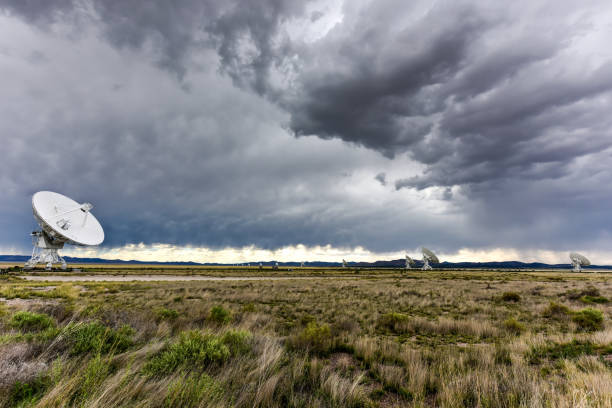Have you ever wondered how the weather can affect your internet connection? Well, when it comes to satellite internet, bad weather can sometimes cause problems. Satellite internet is a way to get online using satellites in space. It’s super helpful for people in places where regular internet connections, like cable or fiber optic, aren’t available. But when rain, snow, or clouds roll in, it can sometimes mess with your satellite internet. In this article, we’ll take a closer look at how the weather impacts satellite internet and what you can do about it. Let’s dive in!
Understanding Satellite Internet
Before talking about how weather impacts satellite internet, let’s first understand what satellite internet is and why it’s significant. Satellite internet involves using satellites in space to provide internet access to users on Earth. This technology is particularly valuable in rural or isolated areas where laying cables for traditional broadband is impractical or cost-prohibitive.
Satellite internet operates by transmitting data signals between the user’s satellite dish and a network of satellites orbiting the Earth. These satellites serve as relays, receiving data from the user’s dish, amplifying it, and then transmitting it back to ground stations connected to the internet backbone.
While satellite internet offers widespread coverage and relatively high speeds, it also comes with certain limitations. For instance, latency (the time it takes for data to travel from the user to the satellite and back) is typically higher compared to other forms of internet connectivity like cable or fiber optic.
Weather’s Impact on Satellite Internet
Weather conditions can indeed affect the performance of satellite internet, primarily due to atmospheric interference. Here are some common weather-related issues:
Rain Fade: When it rains, the water droplets in the air can absorb and scatter the signals that travel between your satellite dish and the satellites in space. This interference is called “rain fade.” When rain fade happens, it can weaken the signal, making your internet connection slower or causing it to drop altogether.
Snow and Ice Interference: Just like rain, snow and ice can also cause problems for satellite internet. If snow or ice builds up on your satellite dish, it can block the signals from reaching the satellites. This can disrupt your internet connection and make it harder to get online.
Cloud Cover: Even thick clouds can affect satellite internet. If there are a lot of clouds in the sky, they can block some of the signals from the satellites, leading to slower internet speeds or intermittent connectivity issues.

How You Can Improve Your Connection During Storms?
Improving your internet connection during storms is important to stay connected when bad weather hits. Here are some simple tips to help you out:
Check Your Stuff: Take a look at your internet gear like your satellite dish or antenna. Make sure everything’s in good shape and there’s no damage.
Find a Good Spot: If you can, put your dish or antenna where it has a clear view of the sky. Try to avoid putting it near trees or buildings that might block the signal.
Keep It Clean: Make sure your gear stays clean and clear. Snow, ice, or even just dirt can mess with your signal, so give it a wipe-down now and then.
Have a Backup Plan: Consider having a backup way to get online, like using your phone as a hotspot or having a different internet service. That way, if your main connection goes down, you’ve got a backup.
Upgrade if You Can: Look into getting a better internet setup if you can afford it. Newer technology can handle bad weather better, so it might be worth the investment.
Stay Updated: Keep an eye on the weather forecast so you know when bad weather is coming. That way, you can be prepared and maybe even take some extra precautions.
Talk to Your Provider: If you’re having trouble with your connection during storms, don’t hesitate to reach out to your internet provider. They might have some tips or be able to help you fix the problem.
Future Advancements in Satellite Internet
The future of satellite internet looks promising, with ongoing developments aimed at improving performance and reliability:
Low Earth Orbit (LEO) Satellites: Instead of orbiting far away like traditional satellites, these new ones will zoom around closer to Earth. That means less lag time and better internet speeds, even in remote areas.
Improved Weather Resilience: Scientists and engineers are working on making satellite internet more resilient to bad weather. That means even during storms, you’ll still be able to stay connected without interruptions.
Better Coverage: Companies are working on deploying more satellites to provide broader coverage around the globe. This means even people in remote or underserved areas will have access to reliable internet.
Faster Speeds: With advancements in technology, satellite internet providers are aiming to deliver faster internet speeds. This will allow users to stream videos, video conference, and download large files more quickly and efficiently.
Affordability: As satellite internet becomes more widespread and competition increases, prices are expected to become more affordable. This will make high-speed internet accessible to more people, regardless of their location or financial situation.
| Call 866-861-4084 for Internet Deals |
Conclusion
In conclusion, it’s clear that weather can indeed impact satellite internet. Rain, snow, and clouds can all interfere with the signals between your satellite dish and the satellites in space, making your internet connection slower or causing it to drop out entirely. While this can be frustrating, there are steps you can take to minimize the effects of bad weather, such as keeping your equipment well-maintained and exploring alternative connectivity options. By staying informed and prepared, you can help ensure that your satellite internet remains reliable even when the weather isn’t cooperating.
FAQs (Frequently Asked Questions)
Can satellite internet be completely unaffected by weather?
While advancements have improved resilience, extreme weather conditions can still impact satellite internet to some degree.
Is satellite internet more susceptible to weather interference than other forms of internet?
Yes, satellite internet is generally more affected by weather conditions like rain, snow, and cloud cover compared to terrestrial options like cable or fiber optic.
Are there any geographical regions where satellite internet performs better in adverse weather?
Satellite internet performance can vary based on factors like antenna positioning and local climate conditions, but there’s no region completely immune to weather-related interference.
How does satellite internet compare to other forms of rural connectivity, such as fixed wireless?
Satellite internet offers broader coverage but may be more susceptible to weather-related disruptions compared to fixed wireless solutions, which rely on terrestrial towers for connectivity.
What steps can users take to minimize weather-related disruptions to their satellite internet service?
Regular maintenance of satellite equipment, proper antenna positioning, and exploring redundancy options are key steps to mitigate weather effects on satellite internet.

Meet Jennifer Harper, a wordsmith extraordinaire who has been shaping the digital landscape with her creative prowess for the past two years. Not just a content writer; she is a storyteller who brings the content to life. Her passion for internet trends, memes, and the ever-evolving world of entertainment is evident in every piece she creates. Jennifer doesn’t just follow trends; she sets them.